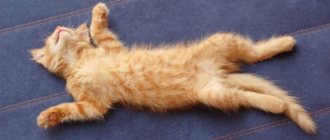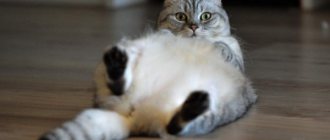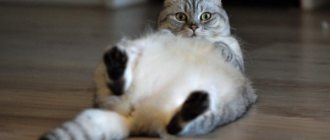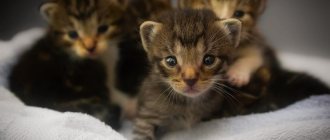Our beloved cats are the most important couch potatoes. Their activity time is much shorter than their resting state. Because of this feature, owners often worry, wondering why their cats sleep so much. Despite the suspiciously high duration, in most cases, cat naps are explained by completely harmless reasons.
Sleep standard for cats
To figure out how much sleep cats need, you need to understand that each animal requires a different number of hours of sleep, depending on how much energy is spent during waking hours and the specific characteristics of the cat.
A cat's sleep is intermittent, the cat does not sleep for 12-16 hours in a row, sleep time is replaced by time for active rest. The animal's sleep is very alert; they can wake up from noise and not sleep again, only to soon fall asleep again.
- Newborn kittens sleep differently: they spend all their time near their mother and wake up only to feed.
- Over time, they need much less time to sleep, but kittens sleep less than adult animals.
To understand how much sleep a cat should sleep at an advanced age, you need to analyze the life of elderly cats: over time, it becomes similar to the life of kittens. They spend almost all their time sleeping.
After sterilization
It should be noted that after sterilization surgery, the cat does not eat and sleeps all the time; this is a normal state after anesthesia. If this period lasts for 24 hours, then there is nothing to worry about. If a day has passed and the condition does not change, you need to urgently see a veterinarian.
During the first 24 hours, you don’t need to force the cat to get up or wake him up if she doesn’t want to. Just like insisting on food and drink. Give her a little rest, recover, and she will again delight you with her cheerful appearance.
If the anesthesia has not worn off and the cat is not sleeping, gets up and tries to move around the apartment, do not let it out of sight so that it does not accidentally get injured. It’s better to take her in your arms, calm her down, and maybe she’ll fall asleep. Sleep is the best medicine here.
Sleep norms in adult animals
If you compare how much cats sleep per day and how much time kittens spend sleeping, then the kittens will win. But as they grow older, their sleep patterns change: adult kittens spend a lot of time sleeping, while older kittens are more awake.
- Sleep lasting 20 hours will not be considered a pathology: this means that the animal’s body requires a long rest.
- By the age of 8-10 years, when cats begin to age, the duration of sleep increases.
There are situations when an adult cat begins to sleep little. This indicates possible stress. With prolonged short sleep, cats begin to get sick and rapidly lose weight.
What should I do if my cat's sleep habits change?
If you start to notice sudden changes in your cat's sleep habits, it's a good idea to have them checked by your veterinarian.
For example, if they start sleeping much more or less than before, this could signal that they are experiencing pain, gastrointestinal problems, or even depression.
However, if your cat starts going to the fresh litter box after you just changed the litter box, don't worry about it. For reasons unknown to researchers, kittens simply love the feeling of fresh litter under their feet.
While some people may think cats are a little lazy because of their sleeping habits, those who know them best realize that they are anything but lazy—they're just experts at slowing down and relaxing. The next time you're feeling stressed, rushed, and unable to concentrate, take your kitty's cue and relax with a nap of your own!
Sleep norms in kittens
An older kitten can sleep 22 hours a day. The age of the animal is of great importance: newborns wake up only to feed, two-month-old kittens sleep much less, exploring the environment close to their mother.
Kittens go to sleep after feeding near their mother. This behavior is not an accident. The kitten is warmer near the mother, which promotes sound and restful sleep.
By 4-5 months, a kitten's sleep pattern approaches that of an adult. The duration of sleep in small kittens depends on three components:
- Hormonal background. It changes in accordance with the age of the animal: it increases in parallel with the growing up of the cat and decreases in old age. Therefore, older cats spend most of their time sleeping, waking up only to eat and go to the toilet.
- Environment. Nutrition, climatic conditions, sudden change of environment.
- Neurology. An animal can be calm or excited depending on the individual characteristics of the nervous system.
A favorable psychological environment in the house is also important for a kitten to sleep well. Kittens do not like harsh sounds; an unfavorable atmosphere will lead to the animal having an anxious and restless sleep.
For cats, it is better to purchase beds that will give the animal a sense of security, or special houses.
If a teenage kitten eats poorly, does not take part in games and sleeps a lot, then you should contact a veterinarian.
Why do cats spend so much time sleeping?
A domestic cat can sleep 20 hours a day.
A warm and calm environment, free access to water and food are ideal living conditions for a small predator, freed from the need to go hunting in search of a potential dinner. Why do cats sleep for so long? What else should pets do if they don’t have any special problems or concerns for survival? During sleep, their body is replenished with energy, which allows the awakened pet to energetically play with household members or other animals in the house.
Many owners of domestic cats notice how quickly their furry pet reacts when they return home after a day of work. The devoted beauty immediately wakes up and hurries to meet her beloved owner, whom she had to miss all day!
The cat quickly wakes up at any rustle or noise. As soon as you open the refrigerator door, she is already in a hurry to enjoy a tasty treat. Many cats also react to the arrival of guests in the house.
Sound and long sleep testifies to her satiety and calmness, which many people can envy. If your pet has such a tendency to sleep long and peacefully, then she is truly happy and calm in your home!
Animal sleep after anesthesia
Considering how much domestic cats sleep, the pet owner will wonder how long the cat will sleep after sterilization.
In this case, everything is individual: of course, the animal’s body cannot help but react to anesthesia, but some animals tolerate it easily and quickly return to normal, but for some animals it is a difficult ordeal. The same answer with castration - it all depends on the individual characteristics of the body.
In addition to operations, the animal's sleep disturbances will be affected by taking sedatives or antihistamines.
Long sleep and its causes
There are several reasons for prolonged sleep. If they are not associated with general lethargy and refusal to eat, then they are considered normal.
Cats are naturally very active. It is vital for them to replenish their strength and sleep is the best medicine for this.
Again, returning to natural premises, it should be noted that in nature, cats are predators. Their main diet consists of food rich in proteins. Pets also eat mainly protein foods, which require a long time to digest.
After sterilization, your cat may sleep longer than usual.
Sleep phases
Pet owners often notice the following picture: a cat could be sleeping soundly, and then suddenly wake up and start running. Cats can rest perfectly in a shallow phase of sleep and suddenly wake up.
Cats have two phases of sleep:
- Slow phase. It is characterized by low blood pressure, low heart rate, and deep breathing.
- Fast phase. Characterized by increased heart rate, increased blood pressure and temperature, and movement of the limbs.
About 25% of sleep in adults is occupied by the rapid phase, in older animals - 15%. When an animal spends a long time in sleep, an alternation of phases occurs: The slow phase is allotted about 20-30 minutes, after which the fast phase begins - 5-7 minutes.
Dreams
Considering how many hours cats sleep, scientists have concluded that cats dream. Dreams occur in the deep phase. They may dream of an active lifestyle: fighting and chasing their own kind, exploring uncharted territory.
- It is assumed that an animal that lives in a favorable psychological environment dreams of games and hunting.
- An animal that does not feel protected may have dreams related to protection.
- There is no evidence that cats dream about people.
- An observant owner can understand by the behavior of the animal in a dream how his pet lives in the house.
How cats sleep
There are times when an animal is not comfortable enough to sleep next to its owner, so it looks for a secret place where no one can disturb it.
Ideally, a cat will never exchange sleeping in bed with its owner for something else.
- A cat that is confident in its owner will sleep on his lap, on his back and with his paws outstretched.
- More often, cats choose a place that is slightly higher than the rest. It should be warm and comfortable there.
- Before going to bed, the animal stomps on the chosen place, relaxes its muscles and falls asleep in a short time. Often cats prefer to fall asleep on their owner's things.
A cat's dream as an indicator of a relationship with a person
Healthy sound sleep is easy to provide only to a well-fed animal. A hungry cat will not go to bed and will restlessly look for something edible. Having had a hearty lunch, well-fed kittens will instantly fall asleep, and if they feel like it’s not enough, they will squeak for some time.
Lack of proper sleep in cats is a sign that the animal is experiencing stress. For example, when a cat is afraid of something or is scared, he cannot sleep much. Because of this, the pet may lose body weight, become overly fearful, and begin to get sick. If you equip your cat with a separate comfortable corner without disturbing her again, the animal will gradually return to its usual rhythm of life and will sleep as much time a day as the cat’s body requires.
An interesting fact is the cat’s choice of the place where he constantly sleeps. Judging by it and by the position in which the furry pet of the whole family sleeps, you can find out how much it trusts its owners. If a cat, starting from the 6th month of life, often sleeps on its back, with its paws spread out and its belly bulging, there should be no doubt - its trust in humans can be assessed with a high score.
Also a confirmation of the friendship between a person and a cat is the choice of the latter’s sleeping place at the owner’s feet, at his head, or just next to him. When falling asleep, the animal “purrs” loudly, which tries to demonstrate its comfort and confidence in safety. If the cat has been tense lately, cannot lie down for a long time and tries to choose more secluded places, then she is worried and is not sure that she will not be harmed. By building a trusting relationship with your animal, you can get rid of the problem of poor quality sleep for your pet.
Sleep disorders
It happens that a cat suddenly stops sleeping the norm and looks tired. The cause may be pregnancy or a sudden change in weather. Often, lack of sleep can be a consequence of illness. Hyperthermia can cause unnatural postures of the animal. Sleeping too much may indicate heart problems.
- Sleep problems can be due to moving, a change of environment, or other stress.
- If the animal begins to sleep more, but play activity has not decreased, then most likely it is due to overeating or temperature conditions. It is necessary to change the animal’s diet and ventilate the room more often.
- If the animal begins to sleep more, plus its play activity has decreased, then it is worth contacting a veterinarian.
An animal's sleep norm may change due to vitamin deficiency, worms, diabetes, cardiovascular diseases, obesity and other diseases.
Long sleep: normal or pathological?
In general, only a veterinarian can make conclusions about a pet’s health. Perhaps the cat is sick, and sleep is a consequence of malaise, weakness and loss of strength.
A kitten, a small cat sleeps all the time and this is normal. Her sleep may be interrupted by short games and food. At the same time, during rest, he can twitch his paws and squeak quietly. Don't worry, these are signs of emotionality experienced during the day's events.
Experts believe that the number of hours a pet naps and sleeps is greatly influenced by weather conditions . Since thermoregulation is important for animals, in the summer, especially on hot days, the rest period may increase and it will seem that the cat is sleeping all day.
A combination of drowsiness and lack of appetite should alert you. Then you definitely need to take your pet to the vet.
In general, long-term sleep is normal for cats, as long as there are no obvious behavioral abnormalities or problems with appetite or bowel movements during wakefulness.
Getting better sleep
In order to establish normal sleep for your animal, you need to:
- Improve nutrition.
- Minimize noise sources.
- Maintain optimal room temperature.
- Encourage the animal to be physically active.
- Do not pet or touch the cat while it sleeps.











